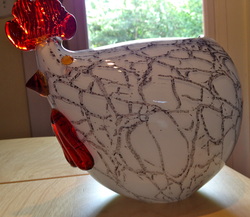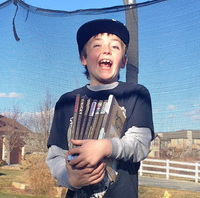
I bought this art glass chicken when I moved into my studio about four years ago. I had a new space, a new desk, and lots of new bookshelves. Filling the shelves wouldn't be hard, what with the billions of books I hoard. But instead of shoehorning in nothing but books, I indulged my nesting instinct and made room for a few additional objects on the shelves, such as photos of my kids and an hourglass representing making time for writing.
That week I happened upon this chicken at the craft store. I knew at once she belonged on my shelves. I was at a point with my writing where I needed to plunge in and take some risks. My new fine-feathered friend would roost on the top shelf—a vantage point from which she would eye me all day, every day, admonishing me to quit being such a big fat chicken.
So now that's her job, being the big fat chicken. My job is to make the art I feel most passionate about and reach out to connect in ways that compel me. Oh sure, those things are still scary. But with a chicken riding shotgun, I have to be the courageous one.
That week I happened upon this chicken at the craft store. I knew at once she belonged on my shelves. I was at a point with my writing where I needed to plunge in and take some risks. My new fine-feathered friend would roost on the top shelf—a vantage point from which she would eye me all day, every day, admonishing me to quit being such a big fat chicken.
So now that's her job, being the big fat chicken. My job is to make the art I feel most passionate about and reach out to connect in ways that compel me. Oh sure, those things are still scary. But with a chicken riding shotgun, I have to be the courageous one.

 RSS Feed
RSS Feed
